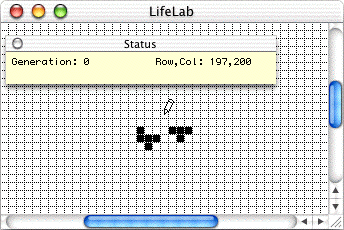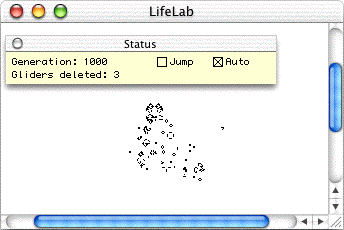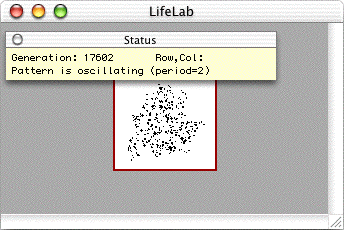
PLEASE NOTE: I'm unlikely to do any more work on LifeLab. But don't panic! In collaboration with Tom Rokicki, I've been working hard on a new Life program called Golly. Not only is Golly about a gazillion times faster than LifeLab, it's free, open source and cross-platform. More details, including screenshots and download links, are available at Golly's web site: http://golly.sourceforge.net/.
LifeLab is a Mac application for exploring John Conway's Game of Life and other cellular automata. CAs were first studied in the mid-1950s by Stanislaw Ulam and John von Neumann. The subject became much more widely known in 1970 when Life was described by Martin Gardner in his Scientific American column. Life is played on an arbitrary-sized grid of square cells. Each cell has two states: "dead" or "alive". The state of every cell changes from one "generation" to the next according to the states of its 8 nearest neighbors: a dead cell becomes alive (a "birth") if it has exactly 3 live neighbors; a live cell dies out if it has less than 2 or more than 3 live neighbors. The "game" of Life simply involves starting off with a pattern of live cells and watching it evolve. Even though the rules for Life are completely deterministic, it is impossible to predict whether an arbitrary starting pattern will die out, or start oscillating, or fill the grid. Life and other CAs provide a powerful demonstration of how a very simple system can generate extremely complicated behavior. System requirementsLifeLab is a Carbonized app that runs natively on OS X. It also runs on OS 8.6/9.x if CarbonLib 1.3 or later is installed. Main features
Screen imagesThe following screen dumps show how a small pattern called Rabbits evolves into a large collection of still lifes and oscillators after more than 17,000 generations:
[scale = 8 pixels per cell] 
The escaping glider on the right is about to be deleted. [scale = 1 pixel per cell] 
[scale = 4 cells per pixel] 
See the LifeLab Gallery for examples of other patterns and other rules. Shareware fee and supportLifeLab is shareware, which means you are welcome to try it out before buying it. If you decide to keep it then please pay the shareware fee:
You can pay by check, cash or credit card at the secure Kagi Online Order site, or you can use the Register app supplied with LifeLab. I provide email support to registered users, so send all your comments, queries and suggestions to andrew@trevorrow.com. Download the latest versionTo download the latest version of LifeLab (4.4), click here [272K]. The archive contains the application, a Read Me file, a Register folder, and a Patterns folder with a small collection of interesting patterns. NOTE: A much larger pattern collection is available to registered users on request.
|